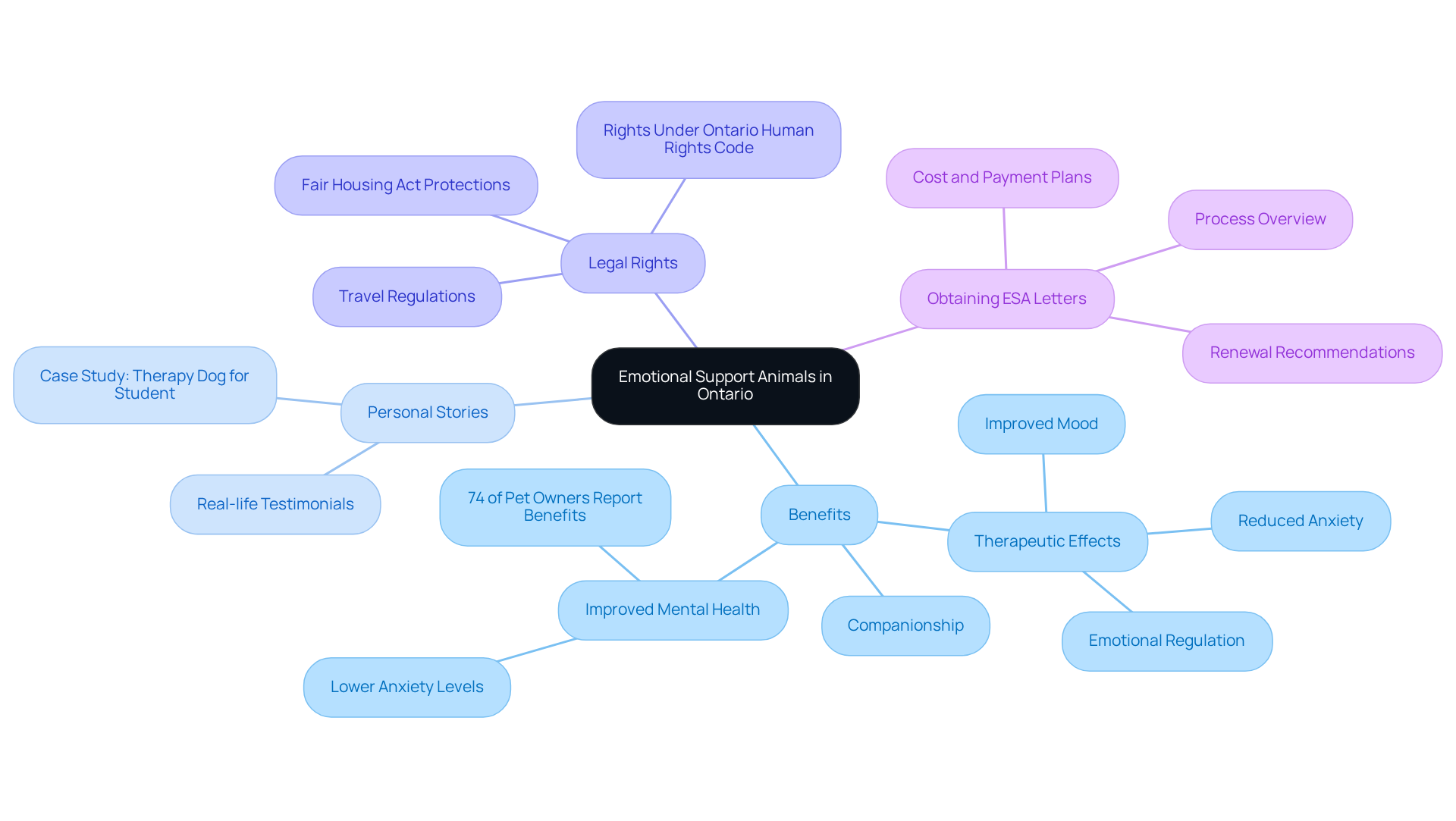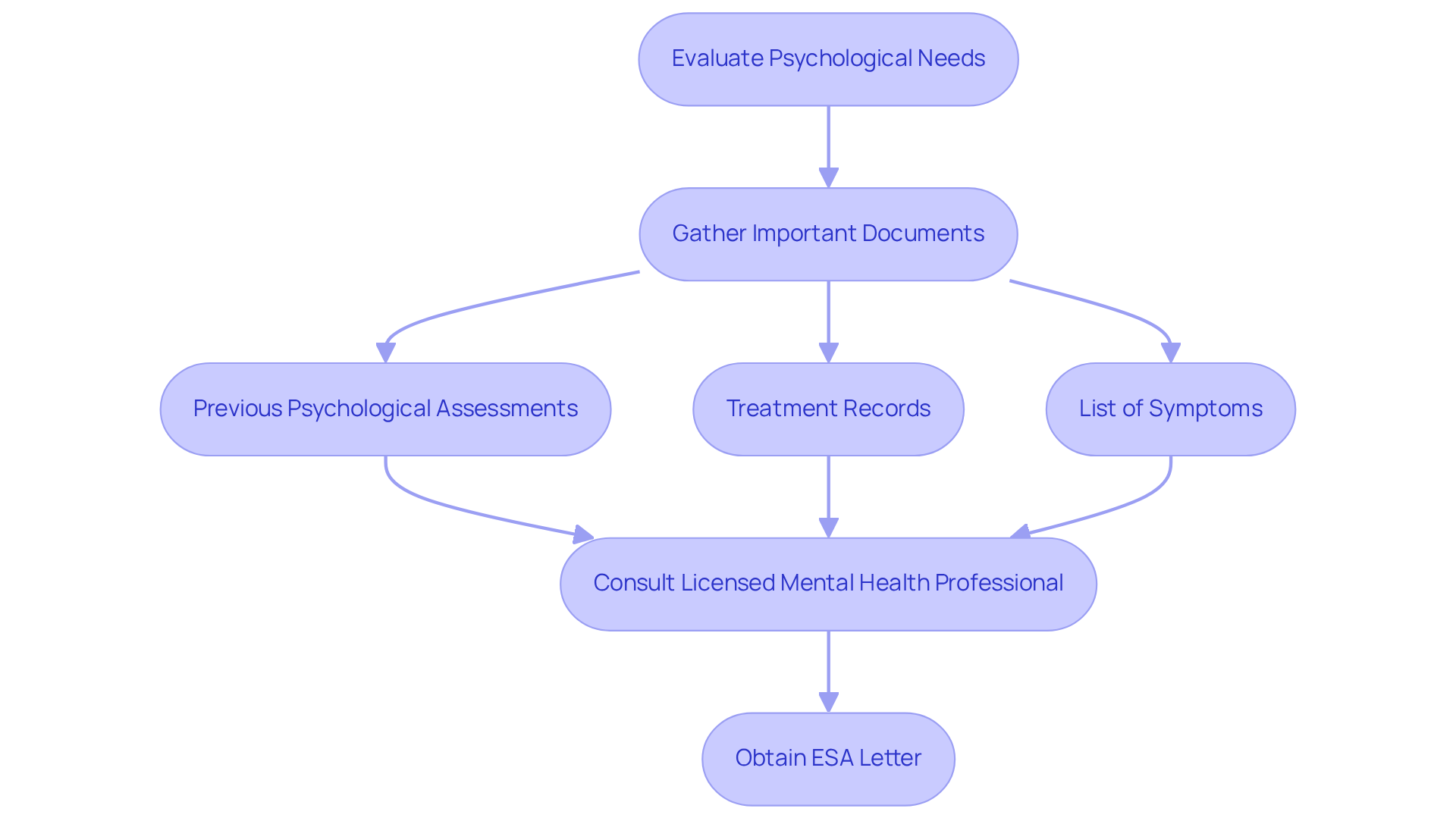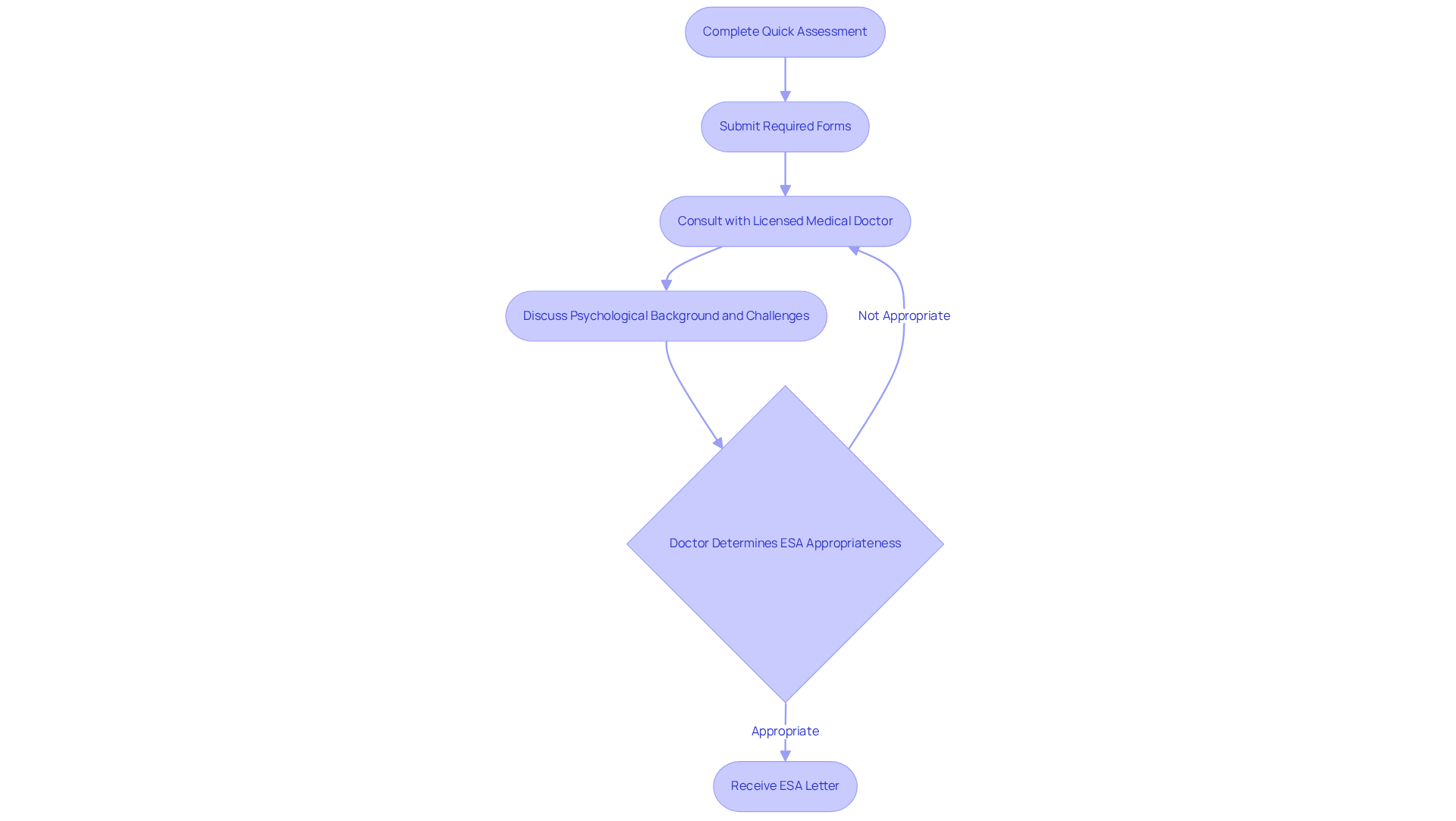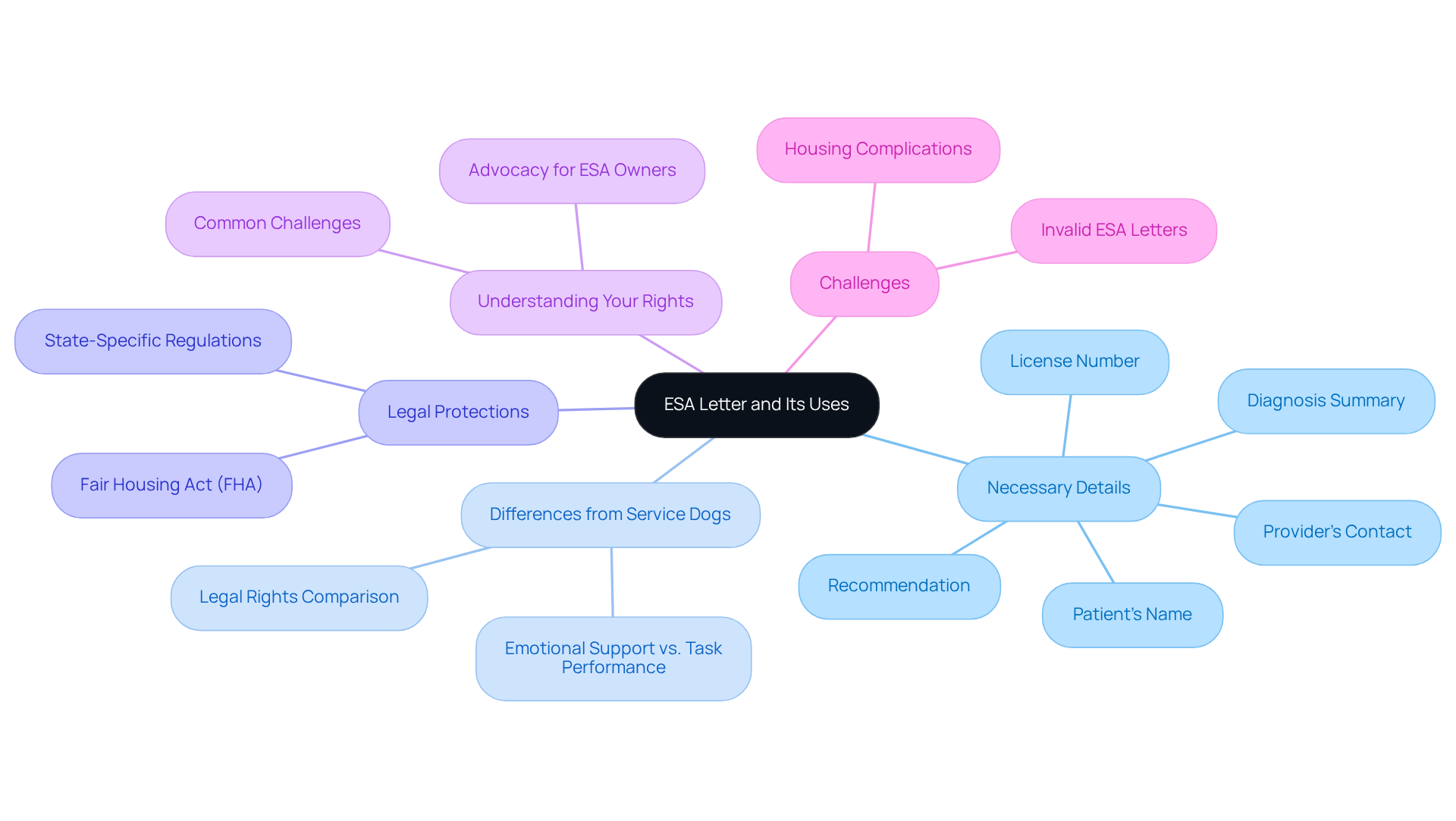

How to Obtain Your Registered ESA Letter in Ontario
by Lena Park
Last updated: September 1, 2025
Verified and Approved by:
Angela Morris,
MSW, LCSW
Fact Checked

Overview
Obtaining your registered ESA letter in Ontario begins with a heartfelt evaluation of your psychological needs. It’s essential to gather the necessary documentation, including assessments from licensed mental health professionals who can confirm your need for an emotional support animal. This process can feel overwhelming, but it’s important to remember that you are not alone. The journey toward securing an ESA letter is a supportive step toward better mental health.
As you navigate this process, consider the emotional challenges you face. Many individuals experience anxiety, depression, or loneliness, and the presence of an emotional support animal can bring comfort and companionship. The article emphasizes the significance of a comprehensive consultation, which not only validates your feelings but also helps you understand the legal protections available under the Ontario Human Rights Code. This knowledge empowers you to advocate for your rights regarding housing and travel with your ESA.
Ultimately, the ESA letter serves as a compassionate solution, providing you with the support you need to enhance your quality of life. Remember, you deserve to feel cared for and supported as you take these important steps toward healing.
Introduction
The increasing acknowledgment of Emotional Support Animals (ESAs) in Ontario underscores their essential role in offering companionship and emotional stability to individuals grappling with mental health challenges. Many individuals are seeking the therapeutic benefits these animals provide, making it crucial to understand the process of obtaining a registered ESA letter. Yet, navigating the legal requirements and determining eligibility can feel overwhelming.
What steps must one take to secure this vital documentation? How can it empower individuals to advocate for their rights in housing and travel? These questions reflect the concerns many face, but there is hope and support available to guide you through this journey.
Understand Emotional Support Animals and Their Importance in Ontario
Registered ESAs (Emotional Support Animals) are invaluable companions for individuals facing emotional challenges such as anxiety, depression, and PTSD. Unlike service animals, registered ESAs do not require specialized training; their primary role is to provide companionship and emotional stability. In Ontario, the recognition of ESAs is growing, reflecting an increasing understanding of their therapeutic benefits. Recent studies indicate that pet ownership correlates with improved psychological well-being, with 74% of pet owners reporting positive effects on their overall condition. This trend is significant as more individuals seek therapeutic companionship to navigate their emotional hurdles.
Real-life stories reveal the profound impact of ESAs on mental health. Many people share how their pets help reduce feelings of loneliness and anxiety, instilling a sense of purpose and routine. For example, a recent case study illustrated how a therapy dog greatly enhanced the mental well-being of a student grappling with anxiety, allowing them to focus better and engage more fully in their academic environment. Such stories underscore the essential role ESAs play in supporting mental health.
Moreover, mental health experts increasingly recognize the value of incorporating ESAs into treatment plans. These animals can facilitate emotional regulation and provide a comforting, nonjudgmental presence during therapy sessions. The Ontario Human Rights Code safeguards the rights of individuals to utilize registered ESAs in housing and travel, empowering them to advocate for their needs.
As awareness of the benefits of registered ESAs continues to expand, it is crucial for individuals to understand their rights and the legal protections available, including those under the Fair Housing Act. This knowledge not only enhances their ability to navigate housing and travel challenges but also reinforces the significance of ESAs in promoting psychological well-being. Wellness Wag offers an affordable and straightforward process for obtaining ESA letters, with interest-free payment plans starting at just $32.25, alongside a Money-Back Guarantee and positive client testimonials to ensure satisfaction. This proactive approach helps individuals maintain their rights and continue to enjoy the companionship of their emotional support animals, while also encouraging annual renewals of ESA letters to prevent potential housing access issues.

Determine Your Eligibility and Gather Necessary Documentation
Determining your eligibility for a registered esa begins with a heartfelt evaluation of your psychological needs. It’s essential to recognize whether you have a diagnosed condition that could truly benefit from the companionship of an animal. Start by gathering important documents, such as previous psychological assessments, treatment records, and a detailed list of symptoms affecting your daily life. This information will be invaluable during your consultation with a licensed psychological expert, who is there to support you.
In Ontario, the documentation required for an ESA letter typically includes a thorough assessment from a licensed mental health professional (LMHP) that acknowledges your emotional or mental disability. You may also need to provide evidence of your condition, such as treatment history or psychological evaluations. Additionally, a clear statement from the LMHP detailing how the ESA will alleviate your symptoms and enhance your quality of life is crucial.
As of 2025, approximately 20% of individuals in Ontario are diagnosed with mental health conditions. This statistic underscores the vital role that support animals play for many. The letter for a registered esa must come from a qualified expert who can confirm your need for a support animal, ensuring that you meet the legal criteria for housing and other accommodations. Remember, you are not alone in this journey; support is available to help you navigate these challenges.

Consult with a Licensed Mental Health Professional
Navigating the journey to acquire your ESA letter in Ontario can be daunting, especially when facing emotional challenges. At Wellness Wag, we understand the struggles that individuals with mental health issues experience. To begin, we invite you to complete our quick assessment, allowing us to better understand your unique situation and support needs. This important first step enables us to tailor our services specifically for you.
Once you’ve submitted the required forms, you will be connected with a licensed medical doctor for a personalized consultation. During this time, it’s crucial to be open about your psychological background and the specific challenges you are facing. This openness allows the professional to accurately assess your situation and determine if a registered ESA would be beneficial for you.
If the conclusion is that a registered ESA is appropriate, the doctor will issue a letter for the ESA. This letter, printed on their official letterhead and including their licensing information, will state that you have a qualifying condition. It serves as essential evidence for obtaining housing and travel arrangements with your registered ESA, affirming your need for support.
In Ontario, the typical wait duration for psychological consultations in 2025 is expected to be several weeks, so we encourage you to start this process as early as possible. Many individuals have found that a comprehensive assessment and clear communication during consultations lead to successful ESA letter issuance, highlighting the importance of seeking the assistance necessary for emotional well-being.
At Wellness Wag, we are dedicated to preserving the confidentiality of your medical information in accordance with HIPAA, ensuring that your experience is seamless and secure. Remember, you are not alone on this journey; we are here to support you every step of the way.

Receive Your ESA Letter and Understand Its Use in Housing and Travel
When you receive your ESA letter, it’s crucial to ensure it contains all the necessary details. This includes the patient’s name, a summary of the diagnosis, a recommendation for an Emotional Support Animal (ESA), along with the provider’s contact information and license number. This letter serves as official documentation of your need for an ESA and must be signed by a licensed mental health professional practicing in your state. You can present it to landlords or airlines to secure the accommodations you need.
It’s essential to recognize that support animals, or ESAs, are distinct from service dogs. While ESAs offer emotional comfort and support to those facing psychological or emotional challenges, they are not trained to perform specific tasks and do not possess the same legal rights to access public spaces as service dogs do under the ADA. In Ontario, the Human Rights Code provides strong protections for individuals with ESAs, allowing them to live with their animals in no-pet housing and travel with them on airlines. Understanding your rights is vital; be ready to advocate for yourself if challenges arise. Many individuals have successfully navigated housing restrictions by presenting valid ESA letters, showcasing the effectiveness of these documents in securing necessary accommodations. However, it’s important to remember that an invalid ESA letter can lead to rejection by landlords or housing authorities. This highlights the need to ensure that your letter meets all legal requirements. By familiarizing yourself with these rights, you empower yourself and enhance your ability to ensure compliance from landlords and service providers.

Conclusion
Registered Emotional Support Animals (ESAs) play a pivotal role in enhancing the mental well-being of individuals facing emotional challenges. The journey to obtaining an ESA letter in Ontario is not merely a procedural task; it signifies a vital step toward securing the companionship that can alleviate feelings of anxiety, depression, and loneliness. It is essential to understand the importance of ESAs, the eligibility criteria, and the necessary documentation for anyone looking to benefit from this supportive relationship.
Throughout this article, we have explored various aspects of acquiring an ESA letter. From recognizing the therapeutic benefits of ESAs to determining eligibility and consulting with licensed mental health professionals, each step is crucial in ensuring that individuals can navigate the process effectively. The significance of having a valid ESA letter cannot be overstated; it serves as the key to accessing housing and travel accommodations, empowering individuals to advocate for their rights.
Ultimately, the importance of registered ESAs in promoting emotional health cannot be overlooked. As awareness continues to grow, individuals are encouraged to take the necessary steps to secure their ESA letters and embrace the companionship that can lead to improved mental wellness. By understanding their rights and the legal protections available in Ontario, individuals can confidently navigate the challenges of housing and travel, ensuring that their emotional support animals are recognized and valued as essential partners in their journey toward better mental health.
Frequently Asked Questions
What are Emotional Support Animals (ESAs)?
Emotional Support Animals (ESAs) are registered animals that provide companionship and emotional stability to individuals facing emotional challenges such as anxiety, depression, and PTSD. Unlike service animals, they do not require specialized training.
How do ESAs benefit individuals with mental health issues?
ESAs can help reduce feelings of loneliness and anxiety, instill a sense of purpose and routine, and improve overall psychological well-being. Studies show that 74% of pet owners report positive effects on their mental health.
Are there real-life examples of ESAs positively impacting mental health?
Yes, many real-life stories illustrate the profound impact of ESAs. For instance, a therapy dog significantly enhanced the mental well-being of a student struggling with anxiety, allowing them to focus better in their academic environment.
How are ESAs incorporated into mental health treatment?
Mental health experts recognize the value of ESAs in treatment plans, as they can facilitate emotional regulation and provide a comforting, nonjudgmental presence during therapy sessions.
What legal protections exist for individuals using ESAs in Ontario?
The Ontario Human Rights Code protects the rights of individuals to utilize registered ESAs in housing and travel, allowing them to advocate for their needs.
What should individuals know about their rights regarding ESAs?
It is important for individuals to understand their rights and the legal protections available under laws such as the Fair Housing Act, which can help them navigate housing and travel challenges.
How can someone obtain an ESA letter in Ontario?
Wellness Wag offers an affordable and straightforward process for obtaining ESA letters, with interest-free payment plans starting at $32.25, a Money-Back Guarantee, and positive client testimonials to ensure satisfaction.
Why is it important to renew ESA letters annually?
Annual renewals of ESA letters are encouraged to help individuals maintain their rights and prevent potential housing access issues related to their emotional support animals.
Certify Your Emotional Support Animal Today

Why You Can Rely on Us?
At Wellness Wag, we believe your pet deserves care rooted in both science and compassion. Each article is carefully researched, written in clear language for pet owners, and then reviewed by qualified professionals to ensure the information is evidence-based, current, and practical for real-life care. Our goal is to help you feel confident in making informed decisions about your pet’s health and well-being.
Reviewed by
Angela Morris, MSW, LCSW
Angela is a licensed clinical social worker with 20 years of experience in patient advocacy and community mental health. She has assisted numerous clients with ESA evaluations and brings a deep understanding of disability accommodations, ensuring that all information is accurate, supportive, and practical.

Written by :
Lena Park
Last Updated :
September 1, 2025












